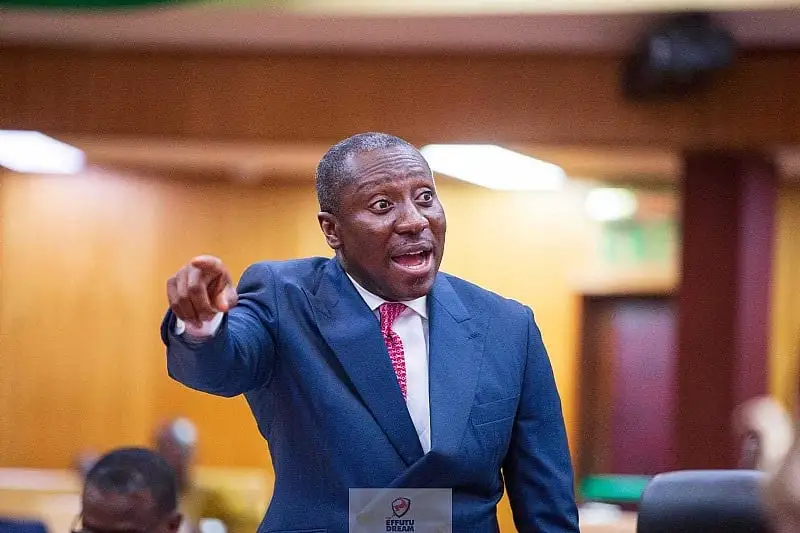The Minority Leader in Parliament, Alexander Afenyo-Markin, has launched a blistering attack on the Mahama administration, accusing it of gross negligence in allowing state-owned machinery intended for road development to be diverted for illicit galamsey operations. During a heated debate on the state of the Ghanaian economy, Afenyo-Markin expressed grave concern over the blatant misuse of equipment allocated to the District Road Improvement Project (DRIP). He alleged that this machinery, procured with public funds for the betterment of the nation’s infrastructure, is being systematically hijacked by individuals engaged in illegal mining, with no apparent intervention from the authorities to curb this blatant abuse. This inaction, he argued, fuels the destruction of the environment and undermines the very foundation of the Ghanaian economy.
Afenyo-Markin’s accusations paint a grim picture of impunity and disregard for the rule of law. He highlighted the alarming paradox of the government’s professed commitment to economic development while simultaneously allowing the unchecked plunder of natural resources through illegal mining. This blatant misuse of public resources, he asserted, not only sabotages critical infrastructure projects but also exacerbates environmental degradation, creating a vicious cycle that jeopardizes the long-term economic prospects of the nation. The Minority Leader emphasized the urgent need for decisive action to address this alarming trend, warning that the unchecked spread of galamsey poses a significant threat to the sustainability of the Ghanaian economy.
The diversion of DRIP machinery for illegal mining operations, as alleged by Afenyo-Markin, represents a significant betrayal of public trust. These machines, purchased with taxpayer money, are intended to improve road networks, facilitating economic activity and enhancing the quality of life for citizens. Their misuse for illicit activities deprives communities of essential infrastructure development while simultaneously contributing to the environmental devastation caused by galamsey. This double blow, Afenyo-Markin argued, undermines the very fabric of national development and perpetuates a cycle of poverty and environmental degradation.
The Minority Leader’s condemnation of the government’s inaction goes beyond the immediate economic and environmental consequences of galamsey. He highlighted the broader issue of impunity, arguing that the apparent lack of repercussions for those involved in the illegal diversion of state resources sends a dangerous message. This perceived tolerance of illegal activity erodes public trust in institutions and fosters a culture of lawlessness that can have far-reaching consequences for the stability and development of the nation. Afenyo-Markin’s call for accountability and decisive action resonates with a growing public frustration over the rampant corruption and mismanagement that plagues the galamsey sector.
The accusations leveled by Afenyo-Markin underscore the complex interplay between environmental degradation, economic instability, and governance failures. Galamsey, with its devastating impact on water bodies, forests, and agricultural lands, poses a significant threat to the long-term sustainability of Ghana’s economy. The diversion of state resources intended for development projects further exacerbates this challenge, hindering efforts to improve infrastructure and create economic opportunities. The apparent inability or unwillingness of the government to effectively address this issue raises serious concerns about its commitment to protecting the environment and promoting sustainable development.
Afenyo-Markin’s forceful critique serves as a stark reminder of the urgent need for comprehensive action to combat illegal mining and its associated challenges. This requires not only strengthening law enforcement and implementing stricter regulations but also addressing the underlying socio-economic factors that drive individuals to engage in galamsey. Furthermore, promoting transparency and accountability in the management of public resources is crucial to restoring public trust and ensuring that development initiatives benefit the intended recipients. The challenge for the government is to move beyond rhetoric and implement concrete measures that effectively address the multifaceted problems posed by illegal mining and safeguard the future of the Ghanaian economy and environment.


